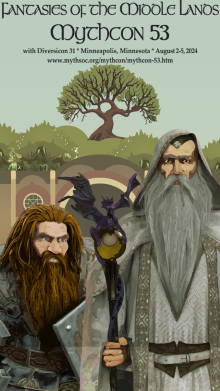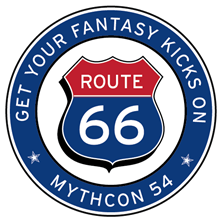Loading...
Location
Minneapolis, Minnesota
Document Type
Presentation
Event Website
https://www.mythsoc.org/mythcon/mythcon-53.htm
Start Date
2-8-2024 2:30 PM
End Date
2-8-2024 3:20 PM
Description
Scholarship on Ista, Dowager Royina of Chalion, was minimal until the most recent anthology on Bujold’s work was published with four essays (out of 14, 28%) that focus on Ista, either as the primary focus of the essay (Yung Lee, Herington,), or as one of two characters analyzed (Palmer-Patel, MacDonald). These essay focus on queer and/or feminist readings of Ista (Yung Lee, MacDonald, Herington), and on analyzing the paradox of free will and fate in the Chalion duology (Palmer-Patel). In “I desire the road,” (Bujold’s emphasis), I build on these essays, all of which I consider convincing and strongly argued) by blending a reader response (my personal feminist killjoy (Ahmed), queer, atheist, sixty-eight year old autist) with an applied linguistic analysis of key passages describing Ista’s conversations and interactions with, variously, the Mother, the Bastard, and the Father in Paladin of Souls in order to consider the extent to which Bujold’s stylistic choices in those passages is more similar to or different from those describing Cazaril and Ingrey’s visions which I analyze in “The Holy Family: Divine Queerness in The Curse of Chalion and The Hallowed Hunt” (Yung Lee and McCormack). I consider the extent to which Ista, a middle-aged
woman, journeys from Dowager to Paladin in the context of kyriarchical attitudes toward middle-aged/menopausal women who are made invisible by their loss of reproductive capability and “beauty” as well as the extent to which the Chalion series undercuts genre fantasy’s reliance on the “Hero’s Journey” (or the attempted equalization of the “Heroine’s Journey) plot, both of which focus on a young person moving into adulthood.
Creative Commons License

This work is licensed under a Creative Commons Attribution-NonCommercial-No Derivative Works 4.0 International License.
Included in
“I desire the road. . . [but] [r]oads were made for young men, not middle-aged women”: Ista’s Journey from Dowager to Paladin
Minneapolis, Minnesota
Scholarship on Ista, Dowager Royina of Chalion, was minimal until the most recent anthology on Bujold’s work was published with four essays (out of 14, 28%) that focus on Ista, either as the primary focus of the essay (Yung Lee, Herington,), or as one of two characters analyzed (Palmer-Patel, MacDonald). These essay focus on queer and/or feminist readings of Ista (Yung Lee, MacDonald, Herington), and on analyzing the paradox of free will and fate in the Chalion duology (Palmer-Patel). In “I desire the road,” (Bujold’s emphasis), I build on these essays, all of which I consider convincing and strongly argued) by blending a reader response (my personal feminist killjoy (Ahmed), queer, atheist, sixty-eight year old autist) with an applied linguistic analysis of key passages describing Ista’s conversations and interactions with, variously, the Mother, the Bastard, and the Father in Paladin of Souls in order to consider the extent to which Bujold’s stylistic choices in those passages is more similar to or different from those describing Cazaril and Ingrey’s visions which I analyze in “The Holy Family: Divine Queerness in The Curse of Chalion and The Hallowed Hunt” (Yung Lee and McCormack). I consider the extent to which Ista, a middle-aged
woman, journeys from Dowager to Paladin in the context of kyriarchical attitudes toward middle-aged/menopausal women who are made invisible by their loss of reproductive capability and “beauty” as well as the extent to which the Chalion series undercuts genre fantasy’s reliance on the “Hero’s Journey” (or the attempted equalization of the “Heroine’s Journey) plot, both of which focus on a young person moving into adulthood.
https://dc.swosu.edu/mythcon/mc53/schedule/12


